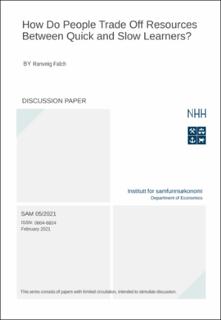| dc.contributor.author | Falch, Ranveig | |
| dc.date.accessioned | 2021-02-08T11:45:13Z | |
| dc.date.available | 2021-02-08T11:45:13Z | |
| dc.date.issued | 2021-02 | |
| dc.identifier.issn | 0804-6824 | |
| dc.identifier.uri | https://hdl.handle.net/11250/2726601 | |
| dc.description.abstract | How society invests in human capital is important for economic growth and social welfare. The paper reports from the first experiment designed to elicit people’s preferences for how to prioritize educational resources, where 2,000 Americans trade off educational resources between quick and slow learners. I find that they give strong priority to slow learners and assign two thirds of the educational resources to this group. Both cost efficiency and the motivation of the learners causally affect the resource allocation. The findings provide important insights for the present policy debate on how to distribute educational resources in society. | en_US |
| dc.language.iso | eng | en_US |
| dc.relation.ispartofseries | DP SAM;05/2021 | |
| dc.subject | Human capital investment, preferences, inequality, experiment, education | en_US |
| dc.title | How Do People Trade Off Resources Between Quick and Slow Learners? | en_US |
| dc.type | Working paper | en_US |
| dc.subject.nsi | Samfunnsvitenskap | en_US |
| dc.source.pagenumber | 56 | en_US |
| dc.relation.project | Norges Forskningsråd: 262675 | en_US |
